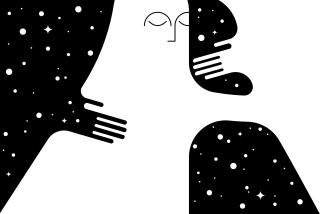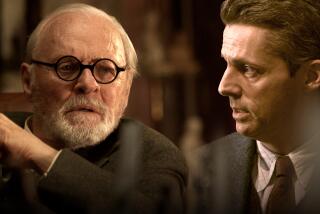A World of Psychophobia
- Share via
Sigmund Freud’s pioneering discoveries about mankind’s psyche have fascinated the public for more than a century, yet they have consistently provoked harsh criticism. The current controversy over Freud and psychoanalysis, precipitated by the Freud exhibit at the Skirball Cultural Center, is but the latest round in a long series of critiques of Freud. In fact, anti-Freudian attitudes almost scuttled this exhibit when it was first mounted at the Smithsonian in Washington. These attacks against psychoanalysis often extend beyond scientific criticism and appear to be a symptom of America’s psychophobia: the fear of what lurks psychologically in the unconscious mind.
Since Freud began his work, humanity has sought to deny the power of its unconscious and displayed an aversion to examining it. In fact, psychophobia is ubiquitous in human nature and has prompted defensive assaults on psychoanalysis from its inception.
But just what is so threatening about Freud’s idea that human behavior is motivated by unconscious psychological forces?
Certainly, Freud offended mankind’s hubris. Human beings generally believe they should be able to control their lives through conscious willpower, and Freud’s theory that they are motivated by unconscious psychodynamics threatens their sense of personal control. It leaves people feeling somewhat helpless, less certain about navigating their lives. Freud then added insult to injury by portraying human beings as motivated by sexual and aggressive animalistic impulses. This was a shattering blow to the belief of human superiority over animals.
But perhaps the greatest threat of Freudian theory concerned what lurks in the unconscious mind. Many people are afraid of their dark side. They fear if they examine their deepest emotional recesses, especially in the presence of an analyst, they will uncover what is worst about themselves and feel unbearable shame or guilt. For example, it is not uncommon for people to suspect they are crazy and that psychoanalysis will validate this. Other fears include being too aggressive, exhibitionistic, perverted, selfish, dependent or depressed. The anticipation of uncovering these undesirable traits and impulses can threaten one’s psychic survival.
Moreover, many experience the prospect of psychoanalysis as endangering vital ties to loved ones. For example, psychoanalytic patients often resist remembering their childhood because they fear they will end up blaming their parents for their problems and feel guilty for betraying them. Such patients often insist therapy has nothing to do with exploring the past and reject Freudian therapy.
Yet, the Freudian analyst would help the patient become aware of the psychological danger of uncovering and understanding the basis for animosity toward loved ones, and how one’s defense against knowing about it contributes to psychological symptoms. Because psychophobia is so endemic to human nature, the process of psychoanalysis involves a continual exploration of the patient’s resistance to knowing what is dreaded in the unconscious mind.
It is, therefore, not surprising that most Americans would prefer to have a physical illness, for which there is a remedy like medication or surgery, than a psychological disturbance calling for psychoanalysis. Even the “unconscious” frequently prefers physical problems to psychological ones as suggested by the prevalence of psychosomatic ailments: physical symptoms--for example, stomach aches--caused by an emotional problem. It has been estimated that more than 50% of a physicians’ practice involves the treatment of psychosomatic complaints.
Even medical schools seem to have submitted to psychophobia by training psychiatrists almost exclusively as psychopharmacologists instead of as psychotherapists.
Perhaps the most deleterious influence of America’s psychophobia has been on the managed-care system, in which mental illness has received significantly less credibility and financial support than physical illness under the rationale of saving money. Thus, insurance companies have been found to cover physical illness over mental illness by a ratio of seven to one, though studies have demonstrated that psychotherapy significantly reduces the frequency of physical complaints.
Ironically, even with managed care’s psychophobic slide toward discriminatory reimbursement of psychopharmocologists and behavior therapists, mental-health professionals seem to regard psychoanalysis as the most interesting game in town. This is because classical Freudian theory provides the most comprehensive understanding of the complexity of human psychological functioning. The psychoanalytic training institutes in Los Angeles have more than doubled in recent years, to accommodate this growing interest.
Freud’s greatness was attributable to the fact that “he disturbed people’s sleep” by making them aware of their deepest feelings and thoughts. We need to watch out for our psychophobic inclination to take a pill and go back to sleep.






